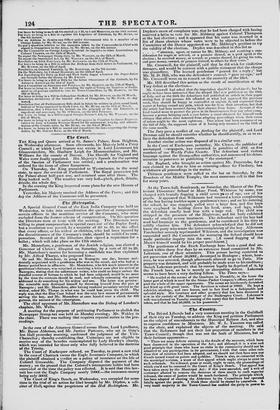In the case of the Attorney-General versus Shore, Lord Lyndhurst,
Mr. Baron Alderson, and Mr. Justice Patteson, who sat in Grays Inn Hall yesterday morning, confirmed the judgment of the Vice- Chancellor ; thereby establishing that Unitarians are not eligible to receive ally of the benefits contemplated by Lady Hewley's charity, which was intended for those only who fully believed in the doctrine of the Trinity. The Court of Exchequer refused, on Tuesday, to grant a new trial in the case of Chattock versus the Eagle Insurance Company, in which the plaintiff obtained a verdict on a policy of insurance on the life of Colonel Greswolde. The Company disputed the payment of the money ; on the ground that the Colonel's intemperate habits had been concealed at the time the policy was effected. It is said that this law- suit has cost the Eagle Company nearly 70001.—the insurance-money being only 5000/.
The Court of King's Bench, on Wednesday, was occupied for some time in the trial of an action for libel brought by Mr. Dryden, a soli- citor of Hull, against the proprietors of the null Rockingham. Mr. Dryden's cause of complaint was, that he had been charged with having received a bribe to vote for Mr. Mildmay against Colonel Thompson at the last election ; and it appeared that his name was inserted in a list of those electors whose votes were to be objected to before the Committee of the House appointed on Mr. Mildmay's petition to try the validity of the election. Dryden was described in this list as
• • : " attorney, agent, or runner for Mr. Mildmay, and receiviug a con- sideration for wages or reward, or a promise thereof, as a paid agent at the election ; he received money, or reward, or promise thereof, for giving his vote, and gave money, reward, or promise thereof, to others for their votes."
Mr. Cresswell, for the plaintiff, said that he did wish for vindictive damages, and would be content with a public statement that the charge was groundless. The learned gentleman " paused for a reply ;" but Mr. M. D. Hill, who was the defendant's counsel, " gave no sign," and Mr. Cresswell went on to remark on the enormity of the libel.
Mr. Hill described this action as the result of mortification at the Tory defeat at the election— Mr. Cresswell hail asked that the imputation should be disclaimed ; but he ought to have been instructed that the alleged libel was published on the 18th of July, and on the 25th the defendants had published an article in their paper stating that if any persons felt offended at what had appeared the previous week, they should be happy to contradict or explain it, and expressed their regret at having caused any pain, which was far from their intention, but that the article had been inserted during their absence from home. Actions of this kind tended more to protect the press in its licentiousness than any other cause, because a person bringing such a case before a court obtained for himself such obloquy that others were deterred from adopting proceedings when their cause of action might be the most righteous. This action had been commenced on the 22d of July, the supposed cause of it having only occurred on the 18th of the same month.
The Jury gave a verdict of one farthing for the plaintiff; and Lord Demnan said he should consider whether heshould certify, so as to re- lieve the defendant from costs.
Another similar action was disposed of in a similar way.
In the Court of Exchequer, yesterday, Mr. Cleave, the publisher of unstamped newspapers, was convicted in penalties of 500/. on five numbers of tne Weekly Police Gazette. The defendant used violent language against the Stamp-office authorities, and announced his deter- mination to persevere in publishing " the unstamped."
Mr. Raphael, who brought an action against Mr. Duncombe, for a sum claimed to be due to him as returning-officer for Finsbury, has withdrawn all proceedings in the matter.
Thirteen gentlemen were called to the bar on Saturday, by the Benchers of the Middle Temple; the most numerous call in that Inn for many years.






























 Previous page
Previous page